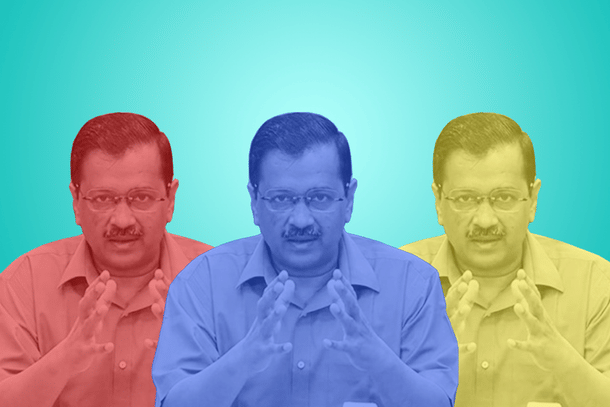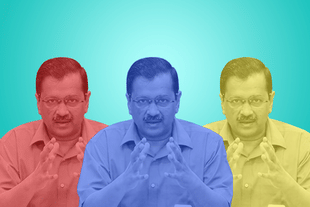Politics
Why Punjab Would Do Well To Not Vote In AAP And Kejriwal
Tushar Gupta
Feb 18, 2022, 05:49 PM | Updated 05:49 PM IST
Save & read from anywhere!
Bookmark stories for easy access on any device or the Swarajya app.


Even if one were to discount Kumar Vishwas’ statement on Kejriwal’s ‘Khalistan’ jibe altogether, or discard his questionable closeness to certain separatist groups in the assembly elections of Punjab in 2017, or the statement from one of the former party members, Gul Panag, on warning Kejriwal about his acquaintance with the separatists back in the happier days, how does one conveniently forget that the foundation of Kejriwal’s politics was not built on the idea of India as Congress or the Bharatiya Janata Party (BJP) perceive it, but something that advocates shredding down the diversity and unity of India to its last thread in the garb of well-marketed anarchy.
Arvind Kejriwal lives, eats, drinks, and breathes protests against the state, even in the capacity of a sitting Chief Minister. In January 2014, a few months before the Narendra Modi government took over in the Centre, the self-proclaimed and proud anarchist threatened to disrupt the Republic Day preparations, stating that not tableaus but thousands of people would throng the city. Seven years later, the farmers Kejriwal had aided at Singhu, Ghazipur, and Tikri with all possible resources fulfilled his prophecy as they vandalised the national capital on Republic Day on their tractors, injured scores of Delhi Police personnel, and marched on to the Red Fort to take down the tricolour.
When it comes to the Centre, Kejriwal has never left any stone unturned to demean the office of the Prime Minister. From choosing to live stream a conference between the Prime Minister and Chief Ministers on pandemic management to calling him a 'coward' and 'psychopath', as a Chief Minister, he has attempted to burn every possible bridge that drives the federal structure in India. From backing every protest, without its merit, be it the students in JNU who wanted to break the Indian union apart to the self-appointed custodians of democracy at Shaheen Bagh, Kejriwal, from time to time, has sparked every protest while hoping to ignite an anarchic situation.
There is no maligning or intended bias here, for Kejriwal has never shied away from making his anarchic aspirations public. Therefore, when someone like Kumar Vishwas, a former confidante of Kejriwal, puts forward such serious allegations, a couple of days before polling, even when taken with a grain of salt, these allegations, pertaining to Khalistan, are not outside the realm of political possibilities. Perhaps, for this very reason, we must dread an AAP government, remote-controlled or eventually taken over by Kejriwal, in Punjab.
There is the question of external security, first and foremost. How safe is a state that shares a border with Pakistan, and is one of the many entry points of the drug route that begins in Afghanistan, under the governance of the AAP?
Sure, the trade agreements and border security are outside the realm of the Chief Minister, but given the concerns highlighted by Captain Amarinder Singh, can a government under AAP be trusted for their efficiency to tackle such threats? With the local police under them, can one rest assured that the cooperation between the Punjab Police and the Border Security Force (BSF) will not be hampered?
Pardon the author’s pessimism, but we are talking of Bhagwant Mann here who was happy to publicly declare the security apparatus of the Lok Sabha.
Then there is also the question of internal security, especially when one factors in the history of the state during the 1980s and his closeness with certain separatist elements. Even if the recently surfaced letter from an infamous entity called ‘Sikhs For Justice’ where they announce their support for Kejriwal on February 20th is discarded, his closeness with similar elements in the diaspora, especially in Canada and the United Kingdom will be a cause of concern for many. In 2017, he was in the news for staying in the house of a former chief of the Khalistan Liberation Front (KLF). In 2018, reports surfaced on overseas separatist bodies funding Kejriwal’s Punjab campaign a year ago.
This prolonged closeness could have consequences for the Hindu-Sikh unity in Punjab, given the two communities have forgotten the wounds of the 1980s, and have prospered together since then. What is therefore the assurance that the AAP, a party that exploited the protests in Singhu and everywhere else for their political gains, will not indulge in similar antics in Punjab? After all, it was the Delhi government under Kejriwal that allowed for the Shaheen Bagh protests to simmer and backed similar elements in Singhu.
Lastly, it is the economic model in question. We have reached that point in Kejriwal’s polity where everything under the sun is promised to be free, at the cost of the taxpayer, the centre’s allocation of funds, and the economy of the state. Even in Punjab, for a state that is witnessing stagnant economic growth in agriculture, weak private sector investments and industrialization, rampant unemployment, rapid economic and brain drain to better pastures in Canada, and a debt that is in excess of Rs. 2.5 Lakh Crore, Kejriwal's economic vision is not aligned to the realities on the ground.
With an ecological and economic disaster imminent in the state, Kejriwal's best bet for the future of the state is an inflated MSP for farmers, welfare schemes sponsored by the Centre, and whatever can be dolled out for free.
It was this celebration of the freebie culture in New Delhi that ended with the Chief Minister running away from responsibility and leaving it to Home Minister Amit Shah to save the city in both the first and the second wave, and this was after he ushered one of the biggest migrant crisis in Anand Vihar. Under Kejriwal’s ‘Delhi Model’, the tax-rich city of Delhi paid for free electricity and water with a dented healthcare infrastructure during the Delta wave. However, how will the debt-ridden state of Punjab repay for the free lunches Kejriwal is promising?
Maybe Kumar Vishwas is lying through his teeth. Maybe that letter of support from ‘Sikhs For Justice’ is a plant to discredit Kejriwal and AAP, but if one factor the previous actions, one the party itself has proudly accepted responsibility for, the potential political future of Punjab fills one with dread and despair, for Kejriwal and the idea of Khalistan have had enough trysts with each other to worry us all.
Tushar is a senior-sub-editor at Swarajya. He tweets at @Tushar15_





